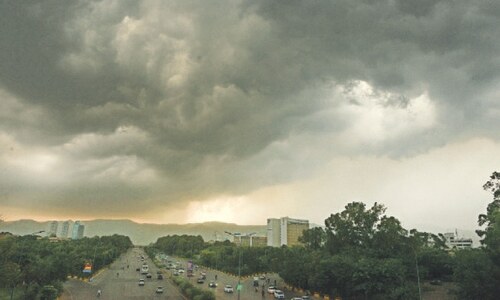ISLAMABAD: Of all the tests for allergies, the most authentic diagnosis for different allergies, including pollen allergy, is that the patient try to detect the cause of allergy himself, said ENT surgeon Dr S.M. Qaiser Sajjad.
Talking to Dawn, Dr Sajjad said pollen allergy must not be taken lightly as symptoms may worsen and cause death within 10 minutes.
Dr Sajjad said that various allergies can also affect the lungs. In the first stage, the respiratory track is affected which starts to narrow, making breathing hard.
In the final stage, the alveoli or the tiny air sacs in the lungs start to narrow because of which a person with pollen allergies may die within minutes of entering into a high pollen count area.
In severe cases, pollen allergy can restrict the respiratory tract and cause sudden death, says PMA official
“When the lungs are blocked, blood starts flowing back to the heart which causes a heart attack,” he explained.
Pollen allergy patients have seen a decrease in symptoms after the recent rain spells and according to the met office, pollen count started to rise again on Sunday with the pollen count of paper mulberry being 329 particles per cubic metres.
When asked why some people are affected more by pollen allergy than others, Dr Sajjad said sensitivity varies from person to person.
“In most cases, people do not have an allergy but develop one over time,” he said.
Dr Sajjad, who is also secretary general Pakistan Medical Association (PMA) said the PMA is very much concerned about the health of the residents of the federal capital, who may face serious problems with the beginning of spring season due to the increased pollen concentration in the air.
“Pollen allergy season usually begins around mid-February and ends in April. Symptoms include a runny nose, nasal congestion, cough, itching in the eyes and throat, headache, sneezing and shortness of breath,” he said.
The doctor suggested people with pollen allergies should remember the times for the rise and fall of pollen in the air during the day and that pollen concentration is low from 10am to 5pm and high from 5am to 10 am and from 5pm to midnight.
“People sensitive to pollen should stay inside before 10am and after 5pm during pollen season and wear facemasks when going outside. They should take a balanced diet, plenty of water and sleep for six to eight hours a day. People should visit their doctor with the onset of symptoms,” he suggested.
Dr Sajjad said people should close the windows in their house so pollen does not get inside.
Do not air clothes out in the open for too long as pollen can stick to them and change and shower when they come home to wash stray pollen off, he said.
The National Institute of Health conducted a survey between 1983 and 1993 and found that almost 15pc of the city’s population has allergies which means almost 300,000 people in the federal capital have allergies.
Published in Dawn, April 10th, 2017













































Dear visitor, the comments section is undergoing an overhaul and will return soon.